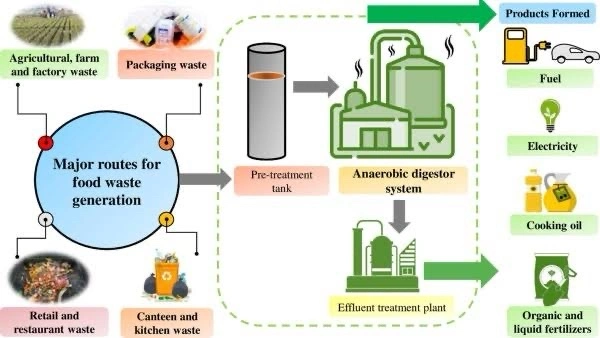
Welcome back to part two of "Turn Your Waste to Wealth: Food Waste Recycling"! The incredible energy and shared passion from our first discussion were truly inspiring. It's fantastic to connect with so many of you who believe, as I do, in the power of giving recycling ♻️ a stronger voice. Let's keep this momentum going, reach even more people, and build that cleaner, healthier environment we all envision, starting right here in Port Harcourt. Ready to dive into today's topic?
Food waste Recycling
Welcome guys to the second part of “turn your waste to wealth; Food waste recycling”
Firstly The incredible response and engagement on the first part truly blew me away. Knowing that so many of you share this vision for a more sustainable future is genuinely inspiring. Together, I believe we can amplify the voice of recycling ♻️, educate more people, and pave the way for a cleaner, healthier environment and atmosphere right here in Port Harcourt and beyond.
Okay enough of the pleasantries lol – let’s get cooking with today’s main dish, shall we? I’m really excited for this one, cause this is something I believe everyone one of us is guilty of.
Food waste refers to edible food that is discarded instead of being consumed, happening at various stages of the food system, from production to consumption. Approximately one-third of the world’s food is lost or wasted every year, equating to a staggering 1.3 billion tonnes. More alarmingly, some recent data suggests this figure could be as high as 40% when losses occurring on farms are also taken into account.

In Port Harcourt, food waste are a significant issue, impacting food security and the economy, due to its high biodegradable content, which can pollute water and soil, create breeding grounds for disease vectors, and generate greenhouse gases when disposed of in landfills.
In the Nigerian context, the environmental impact of food loss and waste is so significant, contributing approximately 5% to the nation’s total greenhouse gas emissions.
This local data underscores the importance of addressing this issue within Nigeria’s efforts to combat climate change.
Wasting food means wasting the resources used to grow, harvest, transport, and process it, including water, energy, and land.
Fortunately, the narrative of food waste doesn’t have to end in environmental degradation. Food waste recycling offers a various pathway to transform wasted food into valuable resources, diverting it from harmful landfills.
The following are helpful ways on how we could transform wasted food:
• food waste for animal feed: this is an effective recycling method.
Food scraps that are no longer fit or safe for human consumption can be processed, often through cooking or drying, and used as a nutritious supplement or alternative to traditional animal feed for livestock such as pigs and chickens.
This practice helps to reduce the demand for conventional animal feed production, which can have significant environmental consequences related to land use and resource consumption.

• Composting: Turning Kitchen Scraps into Garden Food
Composting is a natural way to turn food scraps and garden waste into something that helps plants grow, called compost. At home, you can do this by putting things like fruit and vegetable peels with dry leaves and newspaper in a bin or pile. There are different ways to compost, even using worms!. The compost you get is great for your garden, making the soil healthy and meaning you don’t need to use as many chemicals.
Big composting facilities can handle even more food waste from homes, businesses, and farms. They create the perfect conditions for the waste to break down, sometimes in long piles that get turned, or in closed containers. These big composters can even handle things like meat and dairy, and the high heat kills any bad stuff in the waste.

• Food Waste to Energy (anaerobic digestion): Powering Our Lives
Besides composting, did you know we can also turn food waste into energy?
One way is called anaerobic digestion, where tiny bugs break down the waste without any air. This creates a gas called biogas, which is mostly methane. We can burn this biogas to make electricity, heat, or even turn it into a fuel like natural gas. Just imagine, 100 tons of food waste a day could create enough energy for thousands of homes! There are also other ways to turn food waste into energy, like heating it up in special ways to create fuels, but we won’t be going into that for now, as it will be too complex.

The adoption of food waste recycling practices brings forth a lot of benefits that extend across environmental, economic, and social spheres.
Environmentally, recycling food waste leads to a significant reduction in greenhouse gas emissions by diverting organic matter from landfills and preventing methane production, Anaerobic digestion further enhances this benefit by capturing methane for renewable energy generation.
In conclusion, food waste is a major global issue, but recycling offers a path to resource recovery. Nigeria and Port Harcourt have significant potential for composting and anaerobic digestion given the high organic waste content. Addressing challenges through individual actions, community initiatives, and supportive policies can transform food waste into a valuable resource for a sustainable future.

Anonymous
Nice article. Now, I learn not to waste food in the environment rather in my belly 😄
Mr. P
😂😂
Anonymous
it’s an interesting read, I always enjoy reading your blogs ✅❤️ keep it up bro
Mr. P
Thank you ♻️🥰